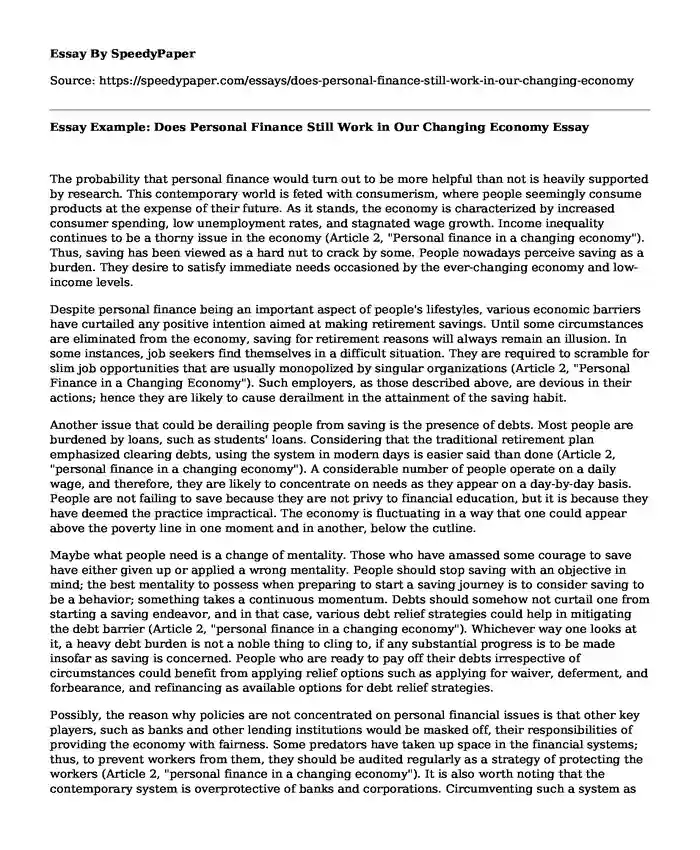
| Essay type: | Problem solution essays |
| Categories: | Economics Money Social issue Essays by pagecount |
| Pages: | 3 |
| Wordcount: | 663 words |
The probability that personal finance would turn out to be more helpful than not is heavily supported by research. This contemporary world is feted with consumerism, where people seemingly consume products at the expense of their future. As it stands, the economy is characterized by increased consumer spending, low unemployment rates, and stagnated wage growth. Income inequality continues to be a thorny issue in the economy (Article 2, "Personal finance in a changing economy"). Thus, saving has been viewed as a hard nut to crack by some. People nowadays perceive saving as a burden. They desire to satisfy immediate needs occasioned by the ever-changing economy and low-income levels.
Despite personal finance being an important aspect of people's lifestyles, various economic barriers have curtailed any positive intention aimed at making retirement savings. Until some circumstances are eliminated from the economy, saving for retirement reasons will always remain an illusion. In some instances, job seekers find themselves in a difficult situation. They are required to scramble for slim job opportunities that are usually monopolized by singular organizations (Article 2, "Personal Finance in a Changing Economy"). Such employers, as those described above, are devious in their actions; hence they are likely to cause derailment in the attainment of the saving habit.
Another issue that could be derailing people from saving is the presence of debts. Most people are burdened by loans, such as students' loans. Considering that the traditional retirement plan emphasized clearing debts, using the system in modern days is easier said than done (Article 2, "personal finance in a changing economy"). A considerable number of people operate on a daily wage, and therefore, they are likely to concentrate on needs as they appear on a day-by-day basis. People are not failing to save because they are not privy to financial education, but it is because they have deemed the practice impractical. The economy is fluctuating in a way that one could appear above the poverty line in one moment and in another, below the cutline.
Maybe what people need is a change of mentality. Those who have amassed some courage to save have either given up or applied a wrong mentality. People should stop saving with an objective in mind; the best mentality to possess when preparing to start a saving journey is to consider saving to be a behavior; something takes a continuous momentum. Debts should somehow not curtail one from starting a saving endeavor, and in that case, various debt relief strategies could help in mitigating the debt barrier (Article 2, "personal finance in a changing economy"). Whichever way one looks at it, a heavy debt burden is not a noble thing to cling to, if any substantial progress is to be made insofar as saving is concerned. People who are ready to pay off their debts irrespective of circumstances could benefit from applying relief options such as applying for waiver, deferment, and forbearance, and refinancing as available options for debt relief strategies.
Possibly, the reason why policies are not concentrated on personal financial issues is that other key players, such as banks and other lending institutions would be masked off, their responsibilities of providing the economy with fairness. Some predators have taken up space in the financial systems; thus, to prevent workers from them, they should be audited regularly as a strategy of protecting the workers (Article 2, "personal finance in a changing economy"). It is also worth noting that the contemporary system is overprotective of banks and corporations. Circumventing such a system as described above, requires people to change their mentality concerning saving. Let people envision saving as being a continuous process; in that case, one may be excused to save as low as possible, as long as they perceive it to be a habit. Personal finance may seem not to work, stemming from the prevailing economic conditions, but it is a process that could be successful if conducted in the right manner.
Works Cited
Article 2, Does personal finance still work in our changing economy?
Cite this page
Essay Example: Does Personal Finance Still Work in Our Changing Economy. (2023, Oct 09). Retrieved from https://speedypaper.com/essays/does-personal-finance-still-work-in-our-changing-economy
Request Removal
If you are the original author of this essay and no longer wish to have it published on the SpeedyPaper website, please click below to request its removal:
- Free Essay on The Zookeepers Wife Book
- Free Essay with a Memo to a Future Student on stay Stay on Campus
- Essay Sample: Hamstring Injuries in Professional Footballers
- Essay Example: Psychopathology in A Clock Orange Movie
- Hiring Diversity Essay, Free Example for Everyone
- Essay Sample: Glenn Gould the Pianist
- Hospital Proof-Based Practices. Essay Example
Popular categories




